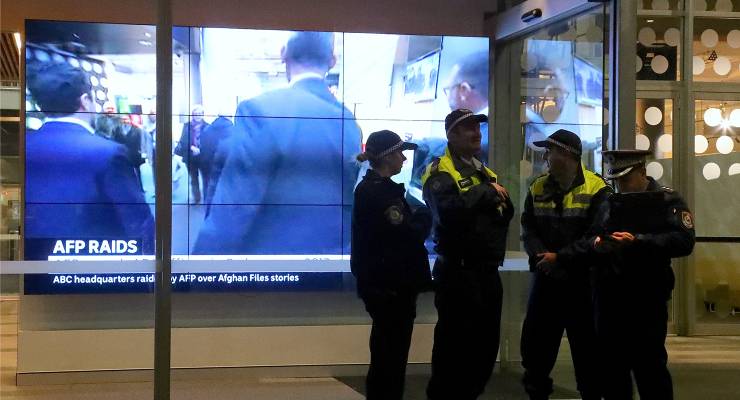
“The [Australian Federal Police] has acted in good faith and professionally at all times during some of the most complex investigations the AFP has ever undertaken,” a spokesperson insisted, as news broke that the federal police are abandoning two criminal investigations into alleged murders involving Ben Roberts-Smith due to potentially inadmissible evidence.
This is the second time an AFP investigation into Roberts-Smith has been compromised, after it was revealed in 2020 that former AFP chief Mick Keelty had been told secret details by serving police and dutifully passed them on to Roberts-Smith.
A statement to the effect of “actually you’re doing an extremely good job and policing is very hard” is not one any law enforcement agency wants to have to release, and comes during a particularly torrid period for the AFP.
Crikey looks back on some of the scandals that have afflicted the AFP in recent years, and the interesting consistency of who seems to benefit from its bungles.
Brittany Higgins
The role of the AFP in the trial of Bruce Lehrmann, who was alleged to have raped fellow former Liberal party staffer Brittany Higgins, which he denies, has been under constant scrutiny. A senior detective who investigated Higgins’ allegation admitted they made a mistake providing sensitive counselling notes to prosecutors and defence lawyers, and Australia’s national law enforcement anti-corruption watchdog is currently investigating alleged leaks to the media by the AFP about Higgins during Lehrmann’s now-abandoned trial.
Indeed, questions are only getting louder regarding how personal texts and recorded conversations picked up by AFP as evidence are now finding their way into the media.
Raids, raids, raids
In June 2019, the AFP raided the home of then-News Corp journalist Annika Smethurst over a story she had published a year earlier concerning a deeply embarrassing revelation for the government: that the Home Affairs and Defence heads at the time had developed a plan to empower the Australian Signals Directorate to spy on and target Australians within Australia. It was a busy week — the very next day the AFP raided the ABC’s Ultimo offices over a series of 2017 stories alleging unlawful killing by Australian troops in Afghanistan.
This special treatment seemingly reserved for organisations who embarrassed the Liberal Party wasn’t just limited to the media. The Department of Home Affairs offices in Canberra were raided in August 2018 as part of an investigation into leaks against Peter Dutton, home affairs minister at the time, over his interventions to save from deportation a number of foreign au pairs linked to politically connected figures and Dutton’s old colleagues.
Abandoned investigations
There’s an interesting corollary — the investigations the AFP decided weren’t worth pursuing. In 2017, the AFP, at the behest of the Registered Organisations Commission (ROC) — itself acting on a referral from then-industrial relations minister Michaelia Cash — raided the Australian Workers’ Union offices, following up on decade-old allegations of vague financial impropriety that conveniently might have been damaging to then-opposition leader Bill Shorten.
That someone had helpfully ensured that the media would be there to capture it became the focus of an ongoing investigation. By January 2019, the AFP announced no charges would be laid over the matter, after Cash had pursued the cunning legal strategy of refusing to talk to them.
The next month, The Australian’s Simon Benson received a leaked classified ministerial briefing from ASIO and Border Force that warned the contentious medevac bill — then being debated in Parliament, and aimed at allowing refugees to transfer to mainland Australia on medical grounds — would “compromise Australia’s strong border protection regime”.
Benson and the Oz suffered no equivalent raids to Smethurst and the ABC, and by June, the investigation was quietly dropped, perhaps on account of the effort it would take to follow up on all 11 people who received the classified file.








Thanks for that excellent article Charlie. Your summary of recent events has caused my levels of anger, bitterness and cynicism to soar to ever greater levels. In particular, the way the AFP has handled this Ben Roberts-Smith matter is especially galling. The AFP should, in theory, be one of the most trustworthy organizations in the nation. It is anything but that. This situation is a disgrace.
Years ago I assisted an Eastern European victim of a violent assault. My every attempt at getting him to talk to the police so that charges could be laid were unsuccessful due to his disillusionment with police forces in general. I told him repeatedly that police forces in Australia are not like his previous experiences. Sadly, I can no longer say that.
Too many situations that have eroded confidence inthe professionalism, competence and independence of the AFP. Who will investigate the AFP?
@krisMD I suspect this investigation is a case of “enough rope”. Roll on a Royal Commission.
I suppose Tony Fitzgerald isn’t available?
Who can forget ‘Honest’ John Howard playing whack-a-mole on Bill Keelty’s head – when Keelty dared publicly let on that our involvement in the invasion of Iraq would render us a more likely Islamic terrorist target? …. Subsequent AFP behaviour….
…. “Bali 9”?
… “Keystone Plods”?
What a lucky AFP “no concluded view” break/outcome for “Dr” Angas Taylor re his stitched together “revelations” over Clover Moore’s travel ‘imbroglio’?
Was there ever a leak inquiry by the AFP into LNP government-inspired leaks that ever found anything the LNP didn’t want them to find?;
Did it ever investigate anything the/any government leaked to trusted sauces…for the goose to gander at?
Does it even count as a leak when the leak is an outright lie, entirely official disinformation?